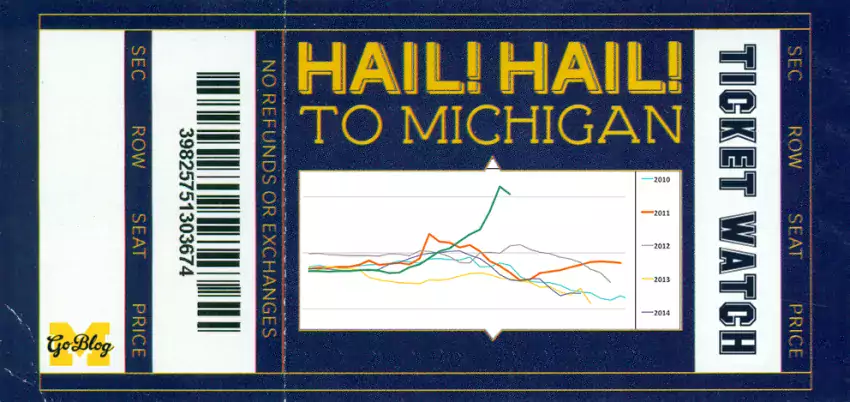
Ticket Watch Preferred Two Cokes

I’ve let this feature wither lately, both because we had a year with no tickets and because what Michigan’s been doing with the ticket market is wonkish, corrupt, and depressing.
What moved me to address it is I think the athletic department’s own short-sighted decisions are going to lead to a remarkably empty Michigan Stadium this year. When that happens, people who don’t bother to cover or think about systemic problems are going to start saying Michigan fans have lost interest in their team. The truth will be something more like “Michigan fans don’t want to pay NFL prices (i.e. $80/ticket) to get into a game versus NIU or Rutgers, and the school and its partners won’t let them in for less.”
In general I prefer to let for-profit entities do what they do within ethical, moral, and legal bounds. My interest is that I believe that certain predatory practices are going to be highly damaging to the long-term health of the program. Every empty seat is one fan who won’t make a connection with the program that day. They’re also visible to the players, the recruits who visit, and the media, who will weave them into simple narratives that are always a referendum on the coach.
Michigan can’t rid society of Great Man Theory (except its history department is doing just that), and the AD has contracts and budgetary responsibilities after a $65M shortfall last year that tie their hands far more than we like to acknowledge. And make no mistake: the coach bears responsibility for the low fortunes of his team last year, and the resulting low expectations are a primary driver of ticket interest.
But I also believe that even with a simmering pandemic, Michigan can make marginally the same amount of money if they make filling Michigan Stadium with Michigan fans a priority. The question—and I don’t know the answer—is whether their contractual obligations will allow the price of tickets to come down to the value of those tickets.
I also see a couple of factors coming together to accidentally shift an unheard of number of Michigan tickets to the secondary market, where Michigan’s official ticket partner’s predatory practices are set up to leave a majority of those tickets unused.
[After THE JUMP: wonky]
Digital Seats
Michigan first made a deal in 2011 under Dave Brandon to make StubHub the official secondary marketplace. The deal was extended in 2017. I am working on finding the details of their current arrangement—it’s not being withheld; I just haven’t had the time to pursue it yet.
The StubHub partnership was the start of the department moving into the secondary ticketing market. The purpose was not purely monopolistic. The unregulated emerging online ticket market had major security flaws: tickets could be listed simultaneously in multiple exchanges, and print-at-home tickets could be easily copied.
The only way to handle these was to make fans exchange tickets personally, or institute a universal ticket exchange. MGoBlog partnered for a time with TiqIQ because I thought their model of person-to-person interaction (through social media accounts) was the most honest way to accomplish this. The other way was for the school to partner with one exchange, and get a chunk of money for the rights, but subject their fans to predatory monopolistic practices.
Michigan Athletics announced in May that they’re going to a Mobile Ticketing system for all sports this year. In a vacuum this is a fine move. Mobile tickets are more secure; they actually change the bar codes against a central database so you can’t print multiple copies. And in theory they’re more transferable, since you can trade them from anywhere on the planet.
There are disadvantages however. They require the users to have working technology, not a wholly sure thing after a day of tailgating (and using your phone to check scores) with tens of thousands of other people on the ground in the vicinity. The transferability means ticket scalping can be industrialized and maximized by financial analysts with spreadsheets instead of on-the-ground pros with street knowledge of market reality. The latter are more likely to have criminal records, but the former are the real crooks.
If you trade commodities on the Chicago Exchange there are strict ethical rules and watchful regulators enforcing them. If you try to buy up 11 percent of hog belly futures on a dip, you’re instantly flagged and told to return them. Event tickets have no such oversight—an exchange can pay an entertainment entity for exclusive rights to trade their tickets. The only guardrails are what the market itself will bear, and what demands the entity made in its agreement.
Michigan’s mobile ticket secondary sales go through an intermediary, StubHub, which a) has total control over your tickets until the moment you’re at the gate, and b) uses its position to gouge and manipulate the secondary ticket market to parasitically extract maximum value from its host.
The Right Price
All it takes is a little napkin math to figure out the formula. Since 2011, StubHub has been jacking that number up every year—it was 10% in 2014 and is now 32.6%, plus a $2.50 “fulfillment fee” per ticket. If you think it’s a bit ridiculous that an enterprise whose overhead is a server and security gets to tax every exchange by a third, buddy, you’re forgetting they charge the seller 15% as well.
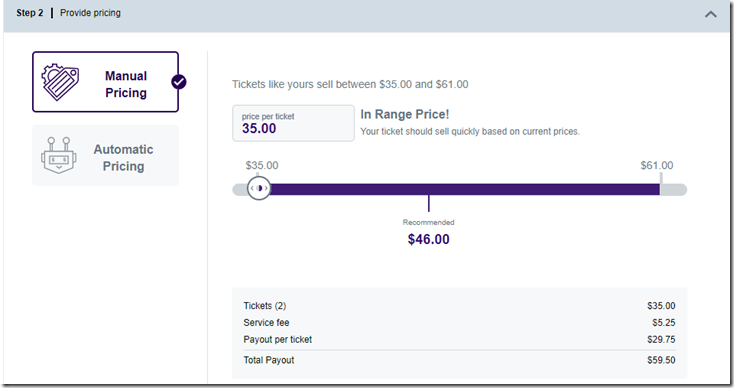
These are my usual seats—Section 18, Row 71. You can manually set your price as low as $6.00 but you have to know to click the purple box with the price per ticket—the slider stops you at $35, which is where the bulk of tickets are currently priced. If you were to buy my two season tickets for the Rutgers game for their recommended price, I would get $78.20, you would pay $126.98, and StubHub pockets $48.78—over 38% of the transaction.
(Actually it’s a little bit more because they sneak an extra $0.55 onto the price of tickets—the explanation for that is more convoluted and doesn’t always apply.)
This is a problem for Michigan because in order to fill its stadium, they need their fans to cover whatever StubHub’s Fanucci-like fingers reach for. And since it’s in StubHub’s interest to keep the market artificially inflated, most Michigan fans who would go to a reasonably priced game can’t find a reasonably priced ticket even when a third of the stadium is listed on the exchange.
What are Tickets Really Worth?
[Barron]
My tickets say I paid $70 each for these so you’re getting them for less. In reality it’s very hard to figure out what I paid for them because Michigan sets the values based on the secondary ticket market, then hides those values by shifting the price of some tickets to others and tacking on fees.
There is a $160 fee to “join the interest list” which is really just your Preferred Seat Donation for 2 tickets at the lowest level, which they then pretend to “waive” for your first year. Slick. PSDs for the bowl go up to $660 per ticket, but what they’re really doing here is taking the cost of buying every ticket from the secondary market, subtracting a piece that they rebrand as a “PSD” to bring down the printed face values of the tickets, and then shifting some of the cost of the premier games. The get-me-in seats a month away from an Ohio State game go for about $250 each on the open market. My Ohio State ticket says $145 was its sticker price. The difference is in my PSD but also in my “$70” Rutgers ticket.
Using the same typical secondary market price, really the school is charging me $35 to include the Rutgers ticket in my package. The other half of the listed price is a mirage to hide the fact they’re pricing these packages for exactly what people would pay for them if they conservatively wanted to buy them on the secondary ticket exchange. That includes the same 80-percent retail surcharge as StubHub.
The Ohio State Ticket Package
You can see the math more clearly when you go to purchase the ticket packs. Here is the most popular sale going on right now:
Let’s say Sue and Ben both want to take their spouses to every Michigan home game this year. Sue buys season tickets; Ben just goes on StubHub and buys literally the two cheapest tickets he can find on there today. What do they actually end up paying per seat?
| Via | PSL | WMU | Wash | NIU | Rutgers | NWern | Indiana | Ohio St | TOT |
|---|---|---|---|---|---|---|---|---|---|
| Michigan | $80 | $60 | $145 | $55 | $70 | $70 | $70 | $145 | $695 |
| StubHub | $- | $62 | $170 | $42 | $62 | $56 | $61 | $228 | $679 |
| Diff | -$80 | +$2 | +$25 | -$13 | -$9 | -$14 | -$9 | +$83 | -$16 |
Michigan is charging its season ticket holder marginally more than it would cost her to buy the same plan on the secondary market at peak pre-season pricing. For locked in slightly better seats, sure. My point is Michigan isn’t selling you an Ohio State ticket for less; they’re selling you a retail product at peak retail pricing and pretending it’s wholesale.
Again, whether you think a capitalist entity acting like one is morally wrong is not part of the discussion (and I’d ask you to keep it out of the comments please). The thing is fans have started to get wise. Also they’re not all fans of the same teams.
The OSU-RU-NIU package is the cheapest way to purchase two Ohio State tickets. Considering the secondary market for Ohio State-Michigan games often reaches $250 to get in, that $280 isn’t so bad of a deal if you are looking to just go to The Game. If you can pick up something for the other two games, all the better. And therein lies the problem, especially because it’s not just Michigan fans buying them.
Ohio State fans are looking at this deal and thinking the same thing I just wrote. I would guess they’re a substantial part of this market, which is only controlled by sending a shareable code by email. That code is indeed being shared on Ohio State sites.
But it’s not just Ohio State fans buying this “Package” with no intention of seeing Rutgers or NIU. And we can tell because there are thousands of seats—in literally every non-student section—available on the secondary market right now. I went around just the endzones this morning and found 2,128 seats listed on StubHub for Rutgers, or about 8 percent of seats in those zones. In July. It should be like 2 percent.
I don’t think it’s hard to draw a line between the ticket packs priced $30 over the secondary market value of an Ohio State ticket, and the flood of tickets people are trying to sell immediately after they buy them.
But if there are so many tickets for sale, why isn’t the ticket price going down?
Empty Seats are StubHub Seats
The answer is StubHub wants to keep the price artificially high, even if the bulk of those tickets never move. Counterintuitively, selling every ticket, and taking the maximum amount of money from customers, are not at all the same thing. The bean counters don’t care if one person pays $60 for a Rutgers ticket or if three people pay $20, except the latter has more upside. From StubHub’s perspective, the more expensive the ticket, the more money they get. MLB has been operating on this principle for years. The seats I had in 2005 used to be $12 and I could usually sell them for $10 to someone who wanted to go on a Tuesday night. Tonight they’re $35. And look how many are available:
You would think all of that supply with historically low demand would lead to some cheap seats. But remember what I told you about the prices being inflated. The sellers aren’t savvy ticket resellers; they’re football fans anxious to make back what’s “Face,” which for Rutgers tickets says “$70.” It’s already rough on them to list those seats for $35, even if 2,000 other tickets are listed at the same price right now. If you actually price them to sell (at like $15), ticket brokers will snatch them up, match them with other seats, and resell them.*
StubHub then uses various tricks, mostly psychological, to convince sellers to list their tickets way above the market. Here’s what the Rutgers seats look like right now on the only exchange for mobile tickets for two together:
That’s the two-together get-in price. If you’re thinking of bringing your kid to a lighter game that you don’t mind leaving early to introduce them to Michigan football, you’ll look at that price and probably think it’s best to wait another year so they can appreciate it. If you and three old college friends are looking to have a reunion and bring the wives, they’re going to look at the price tag and say “That’s more than we’re paying for the AirBnB.”
They’re absolutely not worth that. I spent a decade of Michigan fandom scrounging up tickets and if I ever paid $30 for a Rutgers ticket it was on the 50 yard line. Lately readers have sent them to me to find them a home. I always do. And that tells us something.
Let’s go back to the seller’s side. Here’s me putting the same tickets you see above into their system:
Look what they’re telling me:
- Tickets like yours sell between $35 and $61.
- $46 is “Recommended”. Look at the bar—it’s even conservative!
- Your ticket should sell quickly based on current prices.
- The $35 you put the slider at is the low-low.
- You’re so savvy you’re using Manual pricing. Are you sure you don’t want us to handle it for you? Look at that smart robot!
- You can’t even move the slider below that. Why would you want to?'
If you actually want to go below that you have to figure out that the “35.00” in the gray box is editable. The fact that you can do this is a canard—most people won’t, and that results in a market set where StubHub wants it set. Even if the whole stadium goes on sale, they want the get-in price to be high enough that it costs the buyer $100 for two seats to a 2021 Michigan-Rutgers game. If thousands of people who would go if the price was more reasonable will balk at the price and watch at home, a third as many will bite the bullet and pay the exorbitant prices, and they make the same money.
It might be considerably worse than that because of the current financial situation of StubHub. Right before the pandemic (oooh) the founder repurchased it at $6 billion from the British parent company that owned it. That transaction, which Forbes called the “Worst Deal Ever” has gotten even worse than “I bought the world’s largest live event ticket reseller weeks before a global pandemic” since, because the UK is holding up the deal under anti-trust laws, meaning the new owner can’t get in to fix anything that’s broken, and the people currently operating that business couldn’t care less.
Would they care about Michigan-Rutgers? Probably not. But if they saw the college football market had an extraordinary amount of supply for extraordinary little demand, they might step in and configure some things to get things moving again. As it is, these tickets aren’t moving. It’s July, so the people buying are just deal searchers and travelers (e.g. our group of 8). But tickets are also a commodity with a hard expiration deadline, and there’s no way to move the numbers they’re already holding at the prices they can come down to, especially since a significant portion of the market likely only bought them as a write-off.
*You don’t have a chance against the brokers, especially when it comes to larger groups. They’re way ahead of you, playing the margins in many ticket markets. That too contributed to my malaise about writing these posts. The original purpose was to help Michigan fans find and sell their seats, but there’s nothing more I can recommend that an industry with more time and tools than either of us hasn’t turned to their own profit.
Can We Skip StubHub?
There is a method. Michigan allows fans to transfer their tickets for free through their online system. I am not positive this will work for digital tickets purchased as part of the packs. But if you do match up with other Michigan fans you and your partner can avoid having to pay an extra $15 for every $20 you’re spending on the tickets, so long as you can find your way through the convoluted ticket transfer system. Fewer paper tickets will mean a lot fewer of these transactions, which means a vastly smaller market. I would try to go that route if at all possible.
Michigan Fans Would Fill the Big House if You Remove the Parasite
Worth it. [Fuller]
So let’s recap:
- Michigan fan interest is at a deep low.
- Turnout will be suppressed by the pandemic (please get your shots!).
- Ticket prices, set based on 2019’s secondary market, are well above market value.
- There’s already a huge glut of seats on the secondary market from selling
- Options to resell tickets outside of the secondary market are low.
The school priced their season tickets to make sure they’re making the maximum these tickets would sell for on a free secondary market. Since they’re going to be letting players make money off themselves finally I don’t have any more moral qualms about Michigan athletics getting paid what the market will bear to fill their stadium.
I do have a problem, as a Michigan fan, with Michigan following professional sports into the Malthusian margins where they are filling the stadium at 75% capacity for normal games because the bottom line is higher if you can gouge the fans who can afford it than if you price the building to fill.
And those concerns are turned up to eleven now that the system is expecting the market to bear 2019-level margins. Remember in 2019 Michigan was a favorite to win the Big Ten. Things have changed, and the prices for the tickets haven’t. So what we’re headed for this season isn’t just a breaking point of fan disinterest in a relatively bad team, in a sport where only the same three in 130 teams have a realistic chance of winning a championship. We’re looking at a market that was already bubbled way out of proportion to what the fans would bear, and probably in the process of popping, before an international pandemic and economic belt-tightening.
Can Michigan Do Anything About It?
This is tricky because I don’t know their parameters, and am wary about demanding the school do things outside of their power. That’s a neat way to get attention while assuring your mark can’t ever fix things, so you get to keep being angry forever and ever. Not that I ever see people do that sort of thing.
Realistically then, here are a few ideas on Michigan’s end to start alleviating the bubble:
- Take Ohio State off the ticket pack options immediately, then make those tickets available, at that $140 face value, to Michigan fans who have purchased tickets to non-Ohio State Michigan athletic events.
- Also make these tickets available through Alumni Association clubs, and mailing lists where they are certain to have 90%+ Michigan fans (like the Kids Club members, UGP and M-Den’s mailing lists for customers who’ve bought licensed gear, and students).
- Work with their app developers to track who is coming to Michigan athletic events, and implement a point system that gives priority to fans for showing up to support Michigan sports. Currently the points system is almost entirely purchasable. It should not be restricted to donors—the kinds of fans who are going to every women’s basketball game, buy softball season tickets, and haven’t missed a football kickoff since 1984 are not “We’ve already got them” people to soak—they’re your core ambassadors, as important to you as the too-smart-for-their-own-good Michigan alumni are to us.
- Work with StubHub to free the secondary market. Cap fees if possible. Ask them to turn over their glut of downticket game seats (and compensate the sellers their meagre shares)
- Start dumping free tickets now. Give those seats out to youth leagues, high school football teams (Belleville?!), 7-on-7 teams, athletics alumni, and other adjacent entities you want to keep happy.
- Promote inexpensive ticket options to low-rent games at all live events with Michigan football fans. If there’s an alumni club volunteer project at Forgotten Harvest, the leader should have a code to give out to participants for $20 seats to Rutgers or NIU etc.
- Promote extra seats to adjacent season ticket holders. If two seats are available next to someone who’s bought season tickets for 5+ years, send them an email letting them know their loyalty allows them first dibs on those seats at a much reduced value.
I realize they are already promoting through email channels and giving tickets away to some of the local groups they’ve worked with in the past (like some local churches). They are clearly aware that an empty stadium is a bad look, and there’s only so much they can do about it. I don’t know how seriously the athletic department themselves are taking it.
As for fans looking to buy tickets right now, wait on everything but Washington (for multiple tickets—singles will come way down) and Ohio State, unless you are seriously interested in going to two other games on two other tiers. Every ticket you buy is one less red stain on The Game.
Agreed. I guess my point is that the average price on stubhub is significantly higher because a lot of the people listing their tickets are people who won't be disappointed if they don't actually end up selling. And I think that's one more thing that makes people who do want to sell see that X is the average price for a certain game and they set their price accordingly. It's only one small factor in comparison to the many great points you made in the article.
Is it too late to schedule “Band Day”* for the WMU and NIU games? (And Rutgers.)
*For those too young to remember, in the 70s they would invite about 50-100 high school bands to a non-conference game to fill up one of the end zones.
Heck, in the early 90s I went to band day with my high school at MSU. It is a great way to fill the seats and perhaps start building some emotional attachment with young fans.....but it is NOT a good way to make money. So you can tell I'm skeptical.
I wish I could say I read the whole thing, but I did not. I do appreciate the work you're putting in Seth. Athletic departments from around the country have been pouncing on fan's wallets ever since the Oakland Raiders started Seat Licenses. And there's no end in sight. If they got $250 a ticket in the beginning, and $600 a ticket now, they'll get $1000 in the future.
There will be a breaking point, and sadly, we may see it this year in Michigan Stadium.
It's devastating to watch in real time.
I sit in section 23. I think at $1000 per ticket that is my breaking point. Pretty disillusioned about the prospects for this year but going to every game. Just not the excitement there has been in the past.
Interesting stuff. I was wondering why prices seemed so high and this makes sense. Somewhat relatedly, I really would like to take my family to the Weezer / Green Day show at Comerica in a few weeks. There appear to be TONS of tickets available on StubHub, but the prices are nuts. I was kind of hoping they'd come down as the event got closer, but this makes me think maybe they won't and they really will just have a ton of empty, but paid for seats. I'm not going to drop $500 to take my family to sit in the upper deck of Comerica for this show, but I'd probably pay $200 and I bet if you asked the people selling, there are definitely some folks who would take $200.
Anyway, it sucks that it's come to this. Seems like an opportunity for the mgo ticket exchange to come back.
Thats the thing. The prices won't come down. They used to, but they just don't anymore. It sucks.
The Ohio State game from 2019 was the straw that broke the camel's back for me. With the obligatory contribution, that ticket cost me $300 x 4. $1,200 to freeze my ass off along with the butts of three other family members, watch a blowout and spend an interminable amount of time waiting for TV timeouts to end. The highlight of the day was $10 hot chocolates to use as hand warmers. I'm done with it. I will go to other games but it will be via tickets purchased from the secondary ticket market at sane pricing a day before the game if the weather is nice.
I have the funny feeling that what Michigan is going through isn't going to be unique. High quality HDTV's are a game changer. I think it's more than TV's. I believe many people have reached the point where for many, the product on the field can't be justified by ticket prices.
I do wonder how Michigan is going to keep the status quo with its athletic department if fans stop paying the asking price. OSU is going to have an easier time than Michigan because they have delivered the wins that we haven't.
In all but a few dozen schools, athletic departments are subsidized by the students, Michigan in the past being one of the lucky two dozen. Are you going to make students, many of whom are starting to approach 70K a year when you are out of state pay another charge? Drop some non-paying sports? Something will need to change and it won't be for the better. There are no good answers.
Great work Seth.
The times they are a changing,
Stub Hub just wants to wet its beak.
Seriously, great post. I have wondered why I am being inundated with emails pushing tickets for the first time ever. This explains it.
Am I the only one looking forward to the mocking stories on ESPN pointing out 25-30,000 empty seats this fall?
"Michigan Fans Would Fill the Big House if You Remove the Parasite"
I think the problem is deeper than this. There are many fewer people who can relate to Michigan as a football power. The team has been mediocre for 20 years and the enthusiasm generated by a great team just doesn't exist for many fans. Watching multiple games on TV during the entire day is deemed by many people superior to watching 1 game in person. Michigan alums tend not to stay in Michigan after they graduate. As the Michigan economy has gone south since the 1980s, younger people tend to depart the state, particularly well-educated Michigan alums. Michigan football just seems pointless right now. There is virtually no chance of beating OSU and getting to the Big 10 championship game and no chance of getting to the college football playoff. So, what is the point? The athletic department charges caviar prices for a carp product. All the tradition in the world won't make up for that.
I’m sick of so much of the tradition too. What would excite me most is beating a highly ranked OSU team to punch the ticket to Indy, while feeling so confident that this can be repeated several times in the years to come. What absolutely does not excite me is some former player talking about how great things used to be.
Don't forget the fact that when we make a crappy bowl game all of the upperclassmen sit out so they don't hurt their NFL stock.
Not to mention that a good chunk of that semi-recent tradition is at least somewhat tainted by what came to a head this summer.
Artificially inflated ticket costs plus legions of Buckeye fans readily snatching up tickets for The Game? As if I didn’t think things could get worse...
At least the university can make the Ohio State fans pay financially for our annual bloodletting.
Great article. This is the reason I rarely go to games anymore. I feel bad for my kid, but its just too expensive and really a pain in the ass for the price you pay. I noticed a long time ago that the "cheap" tickets on Stubhub and other sites started to disappear. You used to be able to snag a cheap ticket a day or so before most events. Now it seems the prices never fall even right up to the day of the even. I used to just pay and go to the game or whatever and see a ton of empty seats and wonder why those people didn't lower their price to at least make something. I haven't been to an MLB game in a few years because of this. Teams seem to prefer less people at higher prices than more people at lower prices. I'm sure it wouldn't be hard to do the math and figure out a way to max both, but they don't seem to care anymore.
This made me look forward to basketball season more so than I already am.
Basketball is worse. The lower bowl is often a ghost town. I think basketball actually has a bigger problem than football.
Yeah, but at least the product is good.
If you do it right, it's pretty easy to sneak into the lower bowl at halftime...lol.
Agreed, even tickets to the last couple rows costs a ridiculous amount. And they don’t come down in the days leading up to the game. Now it makes sense why. But it still sucks to see empty seats and insane ticket prices.
If what they've done in the past is true again this year, you're going to have to buy 6 games in total in order to go to MSU or Kentucky. Won't be able to purchase both.
Wow. Seth, you did a great job working through all this for us. Thanks.
From your mouth-like substance to god-like assessment devices.
Seth, you mentioned that it would still be possible for ticket holders to transfer tickets on their own and save fees. Small beans in the end compared to the huge issues you're mentioning, but I wonder if it might make sense for MGoBlog to setup their own GoogleDoc or something to essentially replace the secondary market and allow your readers to find tickets more easily without having to go through StubHub. Maybe you all could even take a cut for managing! Would happily rather pay 5 bucks to you on a $15 Rutgers ticket, rather than paying $100 bucks and giving commissions to StubHub.
Just a half-baked idea, but would be nice to feel like I have an option to find tickets that don't involve scrounging Craigslist/Reddit or going through StubHub.
Someone emailed me this year about bringing it back. The problem with the old Google Doc is bad actors found it and changed everyone's prices. It was taking time to moderate it.
I also once tried to build an app for this but the devs suuuuucked and blew through our capital before they could make something that worked.
Security will be a concern regardless. The only way I see it working is if a few mods maintain a spreadsheet for everyone, or if we bring back annual threads.
I sold extra tix via the spreadsheet every year. I would totally do it again. It was really easy and nice way to connect with other M fans.
I appreciate the sentiment, but I can't even take a shit for under $100 these days. These things typically work themselves out in a free market.
Of course, but not when there is a pure monopoly of the reselling market.
There will be no reselling market if we decide to head out to the golf course on Saturday's. Everyone is competing for your entertainment dollar. Wield your power.
Kudos Seth! That is a heck of analysis! But instead of directing at us poor schmoes who can’t do anything about it, why don’t you send it to Warde Manuel and other leaders of the athletic department. I used to think they knew what they were doing, but I’m not so sure anymore and I doubt anyone has put together such a thorough and lucid analysis as you have about Stubhub’s contribution to price-fixing. Perhaps they will listen and come to their senses, even if your name is not Stephen Ross driving to Schembechler Hall with dump trucks filled with?.
I'm sure they know but as long as they can continue to make money, they won't care about ticket prices regardless of fan attendance.
Has fan attendance been hurt yet? According to USA today, Michigan brought in more than $53m in ticket revenue in 2019. That's only shy of Ohio State and Texas, so it seems to me like they know what they're doing in terms of generating the most money.
Prices were also flat this year. Usually in an OSU year, ticket prices go up.
Don't you think if they gave access for Ohio State tickets to people who bought tickets for soccer or volleyball or women's basketball that OSU fans/ticket brokers would just buy tickets for those events?
While I agree with what you say about the AD making money....uh yeah, attendance has been hurt. Non OSU/MSU games almost never really sell out. Maybe they claim they do, but the empty seat say otherwise.
As long as someone brought tix for the game and if they don't, they won't care because that's still revenue generated for the department
You must really assume people are dumb if they can't figure out to type a number in a box to set their price? When I started to read I got impression that StubHub set a minimum. I am guessing the cheaper ones have sold before you got there right? Keep watching is what I do. Or people don't want to go that low yet.
I think $100 for 2 tickets to Rutgers is not that bad. to pick up right now if you want to go and do some advanced planning. Wait another year for Dad and kid? I think you are way more into this, especially regarding ease of picking up tickets last minute, than the extreme vast majority of fans going to a game. They want certainty and value it. That is what the exchange provides. If you're planning 8 people together for a weekend and can't afford $60 for the game ticket? What?
Agree with you about the OSU ticket 100% although I think people will do a lot of trickeration to get it however the hurdles. Welcome to pro sports.
If they aren't "dumb" as you say, why don't people do it?
I find what people should be and what people are can be different things on the internet, don't you?
Also I *said* a lot of them are Ohio State fans.
People are dumb. And they miss things. Because they're unobservant.
This is tricky because I don’t know their parameters, and am wary about demanding the school do things outside of their power. That’s a neat way to get attention while assuring your mark can’t ever fix things, so you get to keep being angry forever and ever. Not that I ever see people do that sort of thing.
I love that paragraph. The oh so subtle shade layered into the last two sentences... that's how you do it.
Good shit, Seth.
There have been uninteresting tomato cans on the schedule every year since at least Bo Schembechler's first year as coach. That's nothing new.
Big picture, we had a really nice thing going with college football through like 2008 or so. At that point, the MBA types took it over, tried to monetize everything that moved, and ruined it. College and pro football used to be entirely different in coaching and playing styles, the music at the games, playoff philosophy, etc. Now that's pretty much completely closed and college football is pretty much just U-23 pro football, right down to the game presentation and style.
The reaction to that monetization effort was for a lot of people to think the players were getting "screwed," and so now they're getting paid and the professionalization and ruination is pretty much now complete. It's no great surprise the administration and fanbase really isn't that into semipro football. I still can't begin to figure out the blithe assumption all along that they would be. Why was that assumed?
Absent the type of president and administration few of us want to see, and an entirely different philosophy about the university's place, we've unquestionably seen Peak Michigan football. When it (imperfectly) was conceived as part of the educational mission of Michigan students, part of the training of mind and body idea, it worked and the Michigan administrations and fanbase were really into it. This ... does not work.
I got news for you. I've studied early football history as well as anyone and there was never a time when it worked. That training of mind and body as part of the educational mission of the university was all ham from the guys in the 1900s who did more than anybody to professionalize the sport. You're literally quoting Fielding Yost there, who was one of the early professional coaches and butted heads with school administrators all the time because football was becoming a big business.
It goes back earlier. Craig has a story in HTTV this year about how Michigan's 3-year-old stadium that had already fallen behind its peers and didn't have enough seats for the burgeoning sport "burned down" and was replaced with a structure twice as large against the wishes of the president.
Players were getting paid back then too. When they went to a school over money it was because a degree from that school was going to make them more money. When college football wasn't about winning at all costs and making money there were only 17 teams, and some of the guys on those teams would become some of the most awful people in America, including John Chase, a member of Michigan's first-ever team, who went on to murder strikers in a Colorado mine and was horribly fat. So I don't know if the mind and body stuff was any more effective than the educational mission there.
Actually, it goes back to the ancient Greeks -- did you "study" them?
And there were a lot of years between the 1900s and the 2010s.
I mean, the term "student-athlete," which underlies this whole "educating the body and mind" idea, was essentially invented by the executive director of the NCAA (Byers in the quote below) in the 1950s in an attempt to avoid workman's comp claims filed by injured (or killed) players...
“We crafted the term student-athlete,” Walter Byers himself wrote, “and soon it was embedded in all NCAA rules and interpretations.” The term came into play in the 1950s, when the widow of Ray Dennison, who had died from a head injury received while playing football in Colorado for the Fort Lewis A&M Aggies, filed for workmen’s-compensation death benefits. Did his football scholarship make the fatal collision a “work-related” accident? Was he a school employee, like his peers who worked part-time as teaching assistants and bookstore cashiers? Or was he a fluke victim of extracurricular pursuits? Given the hundreds of incapacitating injuries to college athletes each year, the answers to these questions had enormous consequences. The Colorado Supreme Court ultimately agreed with the school’s contention that he was not eligible for benefits, since the college was “not in the football business.”
https://www.theatlantic.com/magazine/archive/2011/10/the-shame-of-colle…
Putting aside the obvious point that the term "student-athlete" didn't need to be "invented" or "crafted" -- it just kind of is, they are student-athletes -- the clip from the article doesn't at all show that the term was "invented" to stave off a workers comp claim. The clip has the Byers quote and then the author, on his own accord, says the term "came into play" in the 1950s in connection with a workers comp case. There's literally no connection between the Byers quote and the workers comp case -- the author misleadingly insinuates that there is and makes you read closely to understand there isn't -- and there isn't any support for the author's claim that the term "came into play" in the 1950s.
A WMU board member told me they had to build new, opulent, expensive dorms because enrollment was declining without them.
I told them they'd have no enrollment problem if they cut tuition in half and pegged increases to the rate of inflation. They and their bloviated ego didn't care much for this.
Colleges seem to have confused biggering with bettering. They aren't the same at all, and when you get them confused you end up with a product that not many people want to afford.
College football is losing me because it's run by greedy, amoral people who have forgotten about the "student" part of "student athlete" (and that "student" comes first), grossly ignored rampant cheating, and because colleges have given disgustingly preferential treatment to kids who can play balls of various sizes and shapes over kids who are kicking ass academically.
Another part of it that drives me bonkers is that I suspect in this day and age that the TV money is what really stirs the drink for Michigan and other big schools more than actual ticket sales. That's why we have to see the red-hat guy stand on the field for long stretches of time while insurance commercials are piped into TV sets around the country. Why not do whatever you can to create the best atmosphere possible in your stadium, which inherently means a lot more concession, souvenier, parking, and tourism dollars??
It feels like Michigan, and college football in general, is trying to solve the wrong problem. They're trying to solve a financial problem of making maximum dollars. In reality the problem is how to generate fan interest in your program/sport - which will ultimately solve the first problem anyway.
The fact that they're doing all of this at the same time the team is struggling, the playoff is broken, our rival is at its 100-year peak, and the pandemic has driven many of us to enjoy our couch....is lunacy. They're not just turning Michigan into a sterile, half-empty pro team....they're turning into a BAD pro team. Watch an NFL game on TV and see how often the camera avoid panning to the stands.
Agree. I said above that it shouldn't be that difficult of a math problem to determine the price to maximize both profit and butts in seats. It just seems teams really don't care and know what price to set for max profit and don't give a shit if people are there or not. MLB obviously gives no shits whatsoever about people at stadium. Hell, with the blackouts, i'm not sure they even care if people watch.
The operators of this blog and a big chunk of the commentators are all smart and observant and perceptive enough to understand that what made heyday Michigan football so cool is that we had a nice quasi-ironic detachment from the idea of its success, while still reveling in its success and being able to revel in its success. Ohio and Alabama and Sparty were always so open and red-faced and creepy and gross about how much they cared and we could always say, "Look how much you care about the success of your football team, and how into it you are, and how ridiculous you look in your caring, and we're still better than you at it." While all the while running a world-class academic institution.
The idea of Michigan football was never to excel at it by outwardly and overtly caring about it more than the other schools and fanbases, and that's why the "money cannon" thing was always so surpassingly misguided. There was never, ever going to be a Michigan football program that beat the cheaters by steering more money to its players once the cheating was legalized. That was never, ever going to happen and honestly, a lot of people and factions don't have any interest in even participating in that. Winning because we were Michigan was awesome; winning because we somehow finagle a couple stores in Briarwood and on State Street to funnel money to players is ... less awesome. It's still puzzling that this awesome blog spent the last ten-odd years getting all wrapped up in that idea.
I dont understand this mentality that Michigan somehow "doesnt care as much" as other football programs.
A. I'm not sure MSU has ever cared as much as Michigan, MSU has always seemed to gravitate to basketball and treated football gamedays as more of a party, even their fans will tell you that
B. How does a program that shares a state with another large school get 100,000 every week by "not caring"?
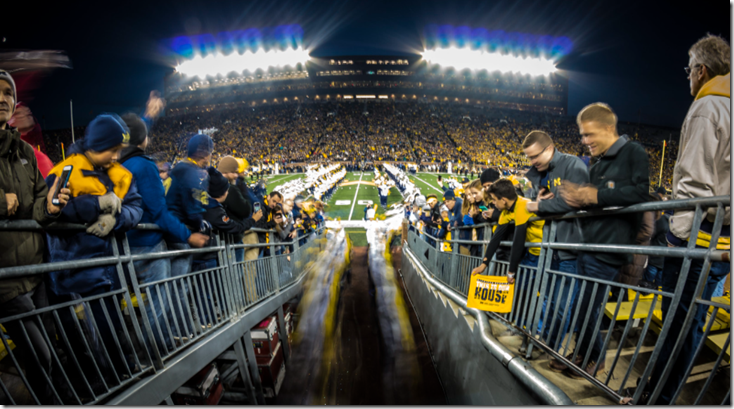
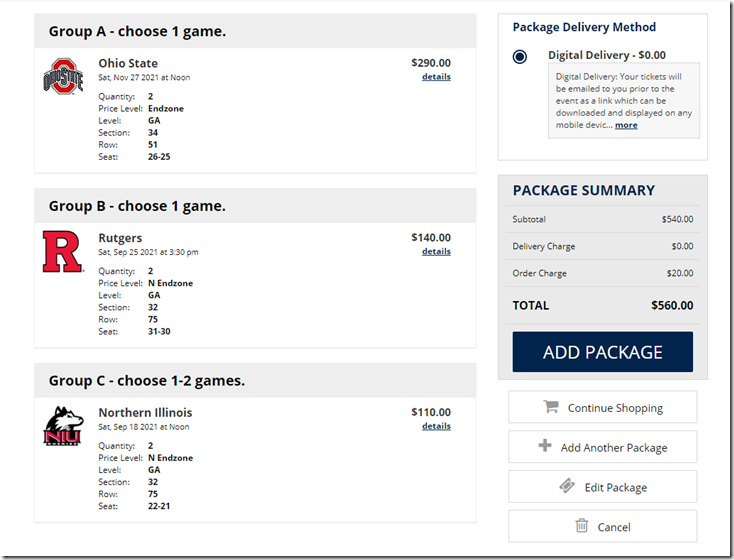
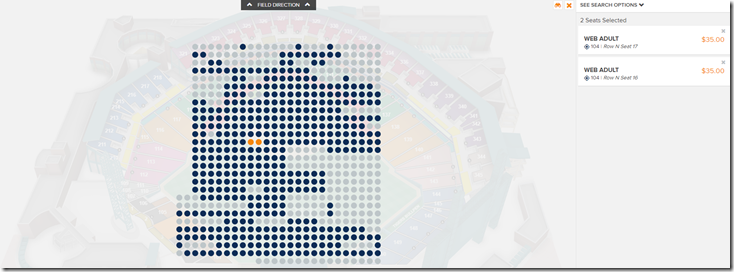
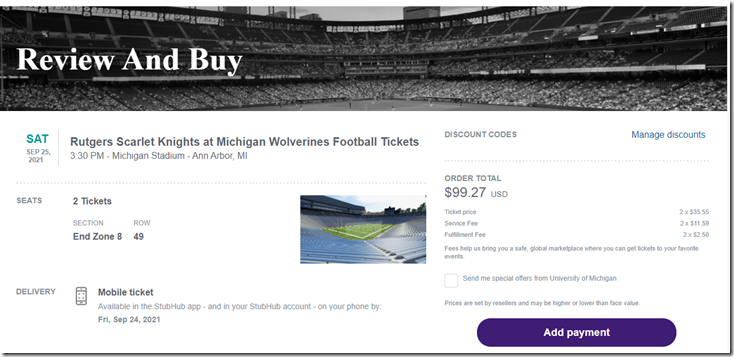

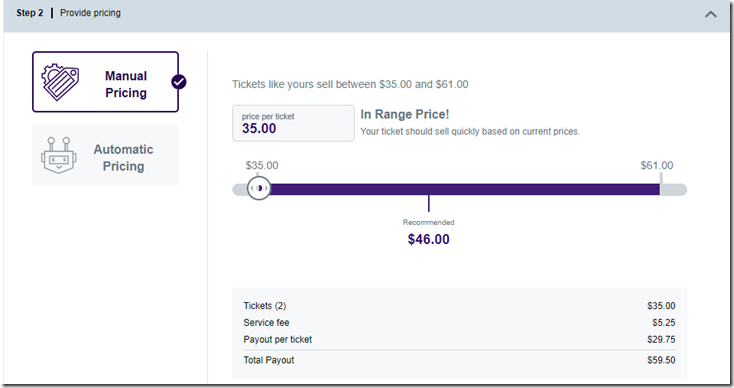
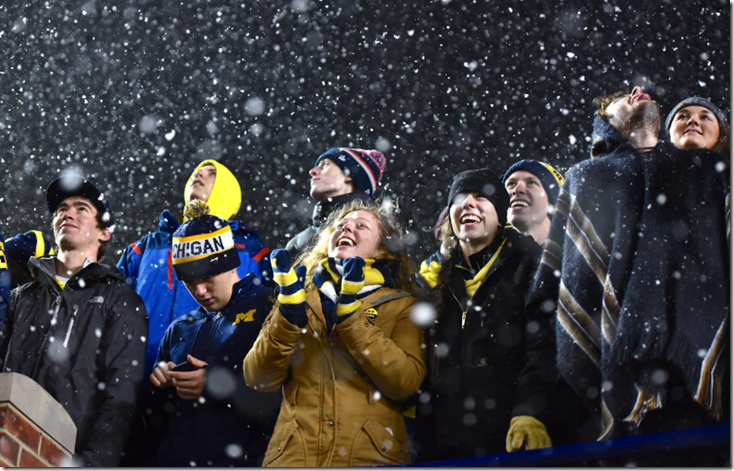
Comments